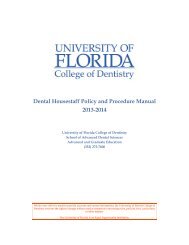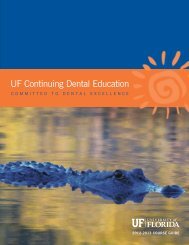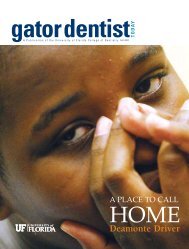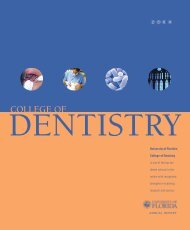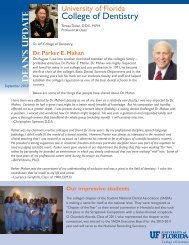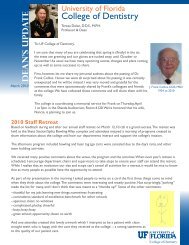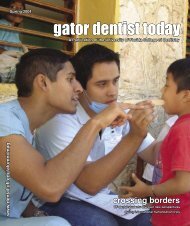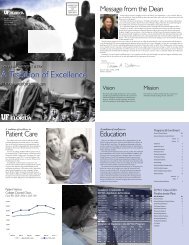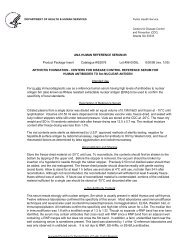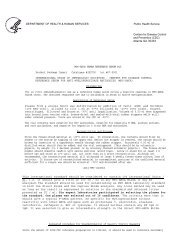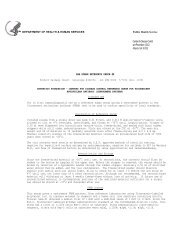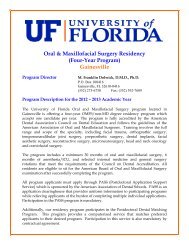gator dentist today - College of Dentistry - University of Florida
gator dentist today - College of Dentistry - University of Florida
gator dentist today - College of Dentistry - University of Florida
Create successful ePaper yourself
Turn your PDF publications into a flip-book with our unique Google optimized e-Paper software.
Expanding Residencies<br />
UF <strong>College</strong> <strong>of</strong> <strong>Dentistry</strong> awarded $1.3 million in training grants<br />
to expand access to dental care for <strong>Florida</strong>’s residents<br />
By LINDY McCOLLUM-BROUNLEY<br />
The <strong>University</strong> <strong>of</strong> <strong>Florida</strong> <strong>College</strong> <strong>of</strong> <strong>Dentistry</strong> is the recipient<br />
<strong>of</strong> $1.3 million in grants from the federal Health Resources and<br />
Service Administration to expand training <strong>of</strong> <strong>dentist</strong>s to care for<br />
low-income and minority groups.<br />
The three-year grants will support expanding residencies<br />
to train more <strong>dentist</strong>s in pediatric <strong>dentist</strong>ry, community-based<br />
primary dental care and public dental health.<br />
“Access to care is a serious problem in this state, and,<br />
indeed, in this country,” said Frank Catalanotto, D.M.D.,<br />
pr<strong>of</strong>essor <strong>of</strong> pediatric <strong>dentist</strong>ry and program director for the<br />
pediatric training grant.<br />
“The patients who represent<br />
the largest segment <strong>of</strong> the<br />
access-to-care issue are<br />
members <strong>of</strong> ethnic and<br />
racial minorities — but they<br />
are also the poor, regardless<br />
<strong>of</strong> ethnicity,” he said.<br />
In <strong>Florida</strong>, nearly 80<br />
percent <strong>of</strong> the state’s lowincome<br />
residents do not have<br />
access to oral health care,<br />
either because they have no<br />
insurance and cannot afford<br />
the treatment or because<br />
no <strong>dentist</strong>s are available in<br />
Advanced Education in General<br />
<strong>Dentistry</strong> resident, Dr. Amira Djuric,<br />
treats Annie Gbikpi (17) at the HCC<br />
dental clinic. Djuric’s residency is funded<br />
through the HRSA grant, enabling the<br />
college to increase residencies from<br />
two to five funded positions. Residents<br />
rotate through the St. Petersburg, HCC<br />
and J.R. Clarke clinics in the Tampa Bay<br />
area. (Photo – Lindy Brounley)<br />
their communities.<br />
“The purpose <strong>of</strong><br />
the grants is to increase<br />
services in underserved<br />
communities,” stated<br />
Pr<strong>of</strong>essor Nereyda Clark,<br />
D.M.D., who authored<br />
the grant proposal for the<br />
community-based primary<br />
dental care training grant.<br />
“The funding factors for our<br />
HRSA grant proposals are that the services and clinics should be<br />
located in federally designated manpower shortage areas where<br />
there are disadvantaged neighborhoods and no <strong>dentist</strong>s,” said<br />
Clark.<br />
Residents in UFCD’s community-based primary dental<br />
care program will rotate between three clinics in Hillsborough<br />
and Pinellas counties, serving indigent and low-income<br />
families.<br />
In Alachua County, which has one <strong>of</strong> the lowest accessto-care<br />
rates in the state, the training grants mean more children<br />
can be treated at Shands/UF Eastside Family Practice Clinic in<br />
Gainesville. The Eastside Clinic<br />
is owned by Shands HealthCare<br />
and houses pediatric and family<br />
medicine, as well as the dental<br />
program managed by the<br />
<strong>College</strong> <strong>of</strong> <strong>Dentistry</strong>’s pediatric<br />
<strong>dentist</strong>ry department.<br />
“This grant will fund<br />
the resident stipends, equipment<br />
purchases — including another<br />
dental operatory, which will<br />
bring us up to eight chairs<br />
— and clinic renovations to<br />
accommodate the additional<br />
chair,” said Catalanotto.<br />
According to Oral<br />
Health America, an organization<br />
that grades states based on their<br />
oral health policy and access to<br />
care, oral diseases, such as tooth<br />
Claudine Gbikpi (8) shows <strong>of</strong>f her<br />
beautiful smile after a visit to the<br />
HCC Dental Clinic.<br />
(Photo - Lindy Brounley)<br />
decay, cancers, gum disease, tooth loss, and oral-crani<strong>of</strong>acial<br />
injuries and birth defects, affect more Americans than any other<br />
group <strong>of</strong> health problems. <strong>Florida</strong> earned a grade <strong>of</strong> C- in Oral<br />
Health America’s 2003 grading project, a below-average grade<br />
influenced by the lack <strong>of</strong> state funding and infrastructure to<br />
facilitate access to dental care for Floridians.<br />
Scott Tomar, D.M.D., associate pr<strong>of</strong>essor <strong>of</strong> public health<br />
and program director for the public health training grant, said<br />
the infrastructure <strong>of</strong> state and county dental health programs<br />
can be effective only when adequate numbers <strong>of</strong> trained dental<br />
public health administrators are available to staff them.<br />
HRSA funding increased pediatric <strong>dentist</strong>ry residencies at UF’s<br />
Eastside Clinic in Gainesville to 12 residents, up from six, as well<br />
as installation <strong>of</strong> one additional completely equipped operatory. The<br />
Eastside Clinic serves a predominantly minority and low-income<br />
patient base. (Photo – Courtesy Health Science Center News and<br />
Communications)<br />
Gator Dentist Today Fall/Winter 2003 15



